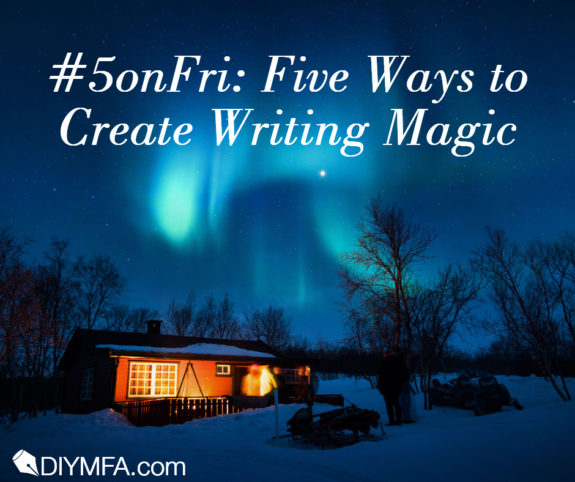Fiction writers have been called many things, but to me “magician” seems the best description. They dip into the black hat of their imagination and produce an endless variety of characters, situations, images, genres, events, and styles. The effect on readers is nothing less than magical, the reader also becoming a magician and an important part of the process. S/he assists in making visible something that wasn’t there before.
Writers and magicians depend on their skillful fingers for their art. Sleight of hand has considerable value in a writer’s bag of tricks—the ability to juggle numerous characters, settings, scenes, and themes simultaneously rivaling the most accomplished conjurer. However, the reader’s willing suspension of disbelief is necessary for the writer’s art to be fully realized.
But trusting in these magician’s skills also requires that the writer suspend her disbelief, her doubts and mistrust in her writing skills. Such a stance isn’t easy. Each time I start a new story, a new chapter, a new novel, I must have confidence that the seeds of my words will take root in the page’s soil and continue to grow, watered and fertilized whenever I open my computer and put fingers to keyboard. I must trust that each work I create will grow within my imagination as I write, and I’ll read and experience things that will feed the book, just as a child grows in the womb. Slowly. Stage by stage. If I have faith in this process, I can have the confidence to proceed.
Here are five steps that will help you exercise your magician’s skills while composing fiction.
1) Find the right voice
Much of writing fiction is searching for the right tone—the correct voice that will fit the narrative and move it along. Probe the prose you have written to discover what the passage needs, what’s hidden between syllables and under words, letting the imagination lead. It’s an ongoing search for the story, for its meaning.
2) Discover the correct path through your story
When something clicks within you, you’ll know you’ve hit the vein and the path will become clearer. The sensation is similar to what a musician hears when a pitch is off. There’s a physical reaction when something doesn’t sound right. Constantly reread what you’ve already written until the material shifts and something new comes into view. I know—the process itself can be agonizing. But the results are worth it. Each day you’ll prove to yourself that you can do it—that your imagination will come through.
3) Let the words lead you
Fondle, tussle with, twist, and stroke the words, willing them into action, like a magician looking into a crystal ball. Approach them contritely, humbly, realizing that they have all the power, the authority here. You’re merely a handmaiden, doing their will. You’re their instrument. The story makes you become more visible as you tease out the strands of plot, image, character. It will work on you as much if not more than you work on it.
4) Write as if you’re a sculptor
Writing is a lot like sculpting and requires the same kind of commitment and perseverance that’s necessary for the final shape to emerge. When I was chiseling an elephant from stone, I had to concentrate on the stone and nothing else, letting it become my guide, like language. The stone was my language, eventually revealing the elephant it was concealing. However, if I hadn’t devoted myself to the process, I would never have discovered what was waiting for me there.
5) Use painters’ techniques to add texture to your prose
Writing is like painting, too. First you sketch in the foreground. Then you must spend a long time filling in the background, working the shadows, a touch of color here, one that will stand out like yellow or red. A deeper tone there so that part will recede. Burnt umber or sienna. A moody deep blue. Oh, yes, the moods—the way color shapes parts of a scene or passage.
Writers use words in a similar way, standing back from a descriptive passage and asking themselves what details they need to include that will convey the various textures they want to create. An action verb here. A strong noun there. An image that will tie together the whole string of words.
This whole process reminds me of Jacob wrestling with the angel. Each time I sit down to work on a novel or story I feel like Jacob. That’s one reason why I have to put more effort into writing fiction. Because of the extra struggle involved, I resist it more than any other genre. Writing essays—travel articles, personal narratives, whatever—and poetry comes easy. No problem. But the other, the invention, takes much more from me. It requires a heroic effort.
Patience is necessary when we get stuck while writing a story or novel. We need to be good parents to our writing selves, sensing when we need to shift our focus or just escape writing for a while. After a break, refreshed, we can return to our work renewed and take up our magician’s wand, savoring the victories we achieve that eventually lead us to the final product.
 Born and raised in Canada, Lily Iona MacKenzie was a high school dropout who has since earned two Masters’ degrees. She has published reviews, interviews, short fiction, poetry, travel pieces, and essays in over 155 American and Canadian venues. All This, a poetry collection, was published in 2011. Her novel Fling! was released in July 2015. Curva Peligrosa, another novel, was brought out in 2017. A third novel, Freefall: A Divine Comedy, was published on January 1, 2019. She teaches creative writing at the University of San Francisco’s Fromm Institute for Lifelong Learning and blogs about writing and reading at lilyionamackenzie.com.
Born and raised in Canada, Lily Iona MacKenzie was a high school dropout who has since earned two Masters’ degrees. She has published reviews, interviews, short fiction, poetry, travel pieces, and essays in over 155 American and Canadian venues. All This, a poetry collection, was published in 2011. Her novel Fling! was released in July 2015. Curva Peligrosa, another novel, was brought out in 2017. A third novel, Freefall: A Divine Comedy, was published on January 1, 2019. She teaches creative writing at the University of San Francisco’s Fromm Institute for Lifelong Learning and blogs about writing and reading at lilyionamackenzie.com.







